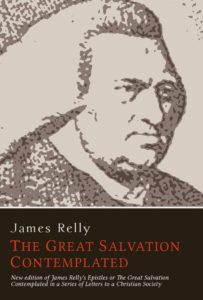
I’m happy to announce a new edition of James Relly’s theological classic The Great Salvation Contemplated. The book has been available online for a while, but I missed a printed edition, so here it is. I’ve written a short introduction (thanks to Alex Smith for proof-reading!) and added an index of biblical references.
Get the book at Amazon (UK) or Amazon (US) for only $10.00/£8.00.
James Relly (1722–1778) was a Welshman, Methodist minister and Universalist theologian. Relly’s theology is among the most radical examples of Christian universalism.
The central idea in Relly’s theology was that the atonement and justification must be understood in terms of humanity’s union with Christ. Humankind is united to Christ in such a way that all human beings are considered as one person with Him. This is a well-known idea in traditional theology but Relly took the consequences a bit further than the standard evangelical account. He insisted that the justification of all human beings has already taken place on the cross once and for all.
Relly’s theology was radically Christocentric. Jesus Christ is himself the new covenant in whom the divine and human natures meet. As such, Christ is also the one in whom humanity becomes elect, as Christ takes upon himself the reprobation of humanity. All have died and been made righteous in Christ’s death and resurrection.
The book’s epistles are apparently written in response to quarrels in a congregation connected to Relly. Relly’s response portrays a mind that prioritizes peace and harmony over doctrinal purity. Like his younger contemporary, Elhanan Winchester, Relly seeks to mediate between Calvinism and Arminianism by posing a soteriological universalism. Relly does not state this belief dogmatically. Jesus Christ is the center of faith. But we can hope that Christ will eventually save all for whom he died, as all human beings come to realize that in him they have been reconciled to God once and for all.
